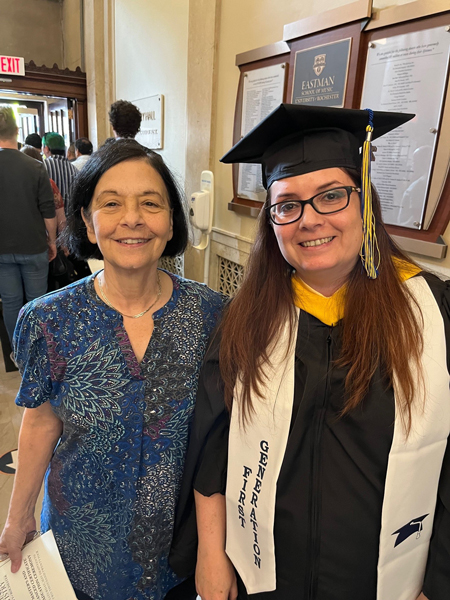News
20242023202220212020
Future COVID Boosters Could Be Nasal: URMC Researchers Lead Study on Next-Gen Vaccines
Wednesday, October 16, 2024
Sore arms may soon rejoice—future COVID boosters could be delivered as a puff instead of a jab. Vaccine researchers at the University of Rochester Medical Center (URMC) are investigating whether nasal vaccines, already available for the flu, can be effective against COVID-19.
"Most of the time, the strains we select for vaccines aren't a perfect match, because the virus evolves faster than we can keep up," said David Topham, PhD, founding director of the University of Rochester’s Translational Immunology and Infectious Disease Institute and principal investigator of the new study. "We need vaccines that elicit cross-reactive immunity—immunity that doesn’t rely on which strain is circulating but still offers protection and prevents severe illness or hospitalization."
This study aims to set important benchmarks that could guide the development of COVID-19 nasal vaccines, which have the potential to strengthen the immune response in the respiratory system, where the virus initially attacks. A COVID-19 nasal vaccine is currently being tested in an early-stage clinical trial sponsored by the National Institute of Allergy and Infectious Diseases (NIAID).
The new study will use data previously collected by a consortium that included Angela Branche, MD, co-director of the URMC Vaccine and Treatment and Evaluation Unit. This prior study, called COVAIL, compared single- and multi-strain COVID vaccines. Results published in Nature Medicine in 2023 showed that boosters don’t need to match a specific strain to provide protection.
Read More: Future COVID Boosters Could Be Nasal: URMC Researchers Lead Study on Next-Gen VaccinesResearch: How the Immune System Fails as Cancer Arises
Wednesday, September 11, 2024
Cancer has been described as “a wound that does not heal,” implying that the immune system is unable to wipe out invading tumor cells. A new discovery confirms that a key molecule can reprogram immune cells that normally protect against infection and cancer, turning them into bad guys that promote cancer growth.
Studying the behavior of these “pro-tumor” immune cells is important because they could be targets for therapies that block their harmful activity, said Minsoo Kim, PhD, corresponding author of the study and a research leader at the Wilmot Cancer Institute.
The Proceedings of the National Academy of Sciences (PNAS) published the discovery.
Kim led a team of scientists investigating the dynamic interactions that occur between cells in the tumor environment, and the underlying factors that cause the harmful transformation of immune cells from good to bad.
They found that PAF (platelet-activating factor) is the key molecule that controls the destiny of the immune cells. PAF not only recruits cancer-promoting cells, but it also suppresses the immune system’s ability to fight back. In addition, they found that multiple cancers rely on the same PAF signals.
Read More: Research: How the Immune System Fails as Cancer ArisesWhat Is H5N1 Bird Flu, How it Spreads to Humans, and Safety Concerns
Thursday, June 20, 2024
 The H5N1 virus, also known as avian or bird flu, is once again in the news and on the radar of scientists and public health officials as a growing number of infections have been found in dairy cattle and farm workers.
The H5N1 virus, also known as avian or bird flu, is once again in the news and on the radar of scientists and public health officials as a growing number of infections have been found in dairy cattle and farm workers.
David Topham, PhD, a professor of Microbiology and Immunology and director of the University of Rochester Translational Immunology and Infectious Disease Institute, has been studying the H5N1 and other influenza viruses for 27 years.
Read More: What Is H5N1 Bird Flu, How it Spreads to Humans, and Safety ConcernsCongratulations Adina Longyear
Tuesday, May 21, 2024
